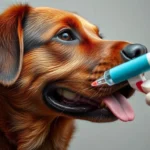
Introduction
The increasing prevalence of cannabis-infused products in households has raised serious concerns for pet owners. Edibles, specifically those infused with THC (tetrahydrocannabinol), are becoming more common, and with this rise comes the potential for accidental ingestion by pets. If you’re wondering, “My dog ate an edible,” you’re not alone, and it’s critical to understand the risks involved and the steps needed to ensure your furry friend’s safety.
Understanding Edibles
What Are Edibles?
Edibles are food products that contain cannabis or its active compounds, such as THC and CBD (cannabidiol). They come in various forms, including:
- Candies: Gummies, chocolates, and hard candies.
- Baked Goods: Cookies, brownies, and cakes.
- Oils and Tinctures: Concentrated cannabis extracts.
Common ingredients in edibles include not only THC and CBD but also sugar, chocolate, and various flavorings. While some ingredients may be safe for humans, they can pose significant health risks to dogs.
The Rise of Edibles
The legalization of cannabis in many regions has contributed to the rapid growth of the edibles market. According to various studies, pet poisonings related to cannabis consumption have also increased dramatically. In fact, reports indicate that calls to poison control centers for pets have risen by over 400% since the legalization of cannabis in several states.
Risks of Edibles for Dogs
THC Toxicity in Dogs
THC affects dogs quite differently than it does humans. Dogs have more cannabinoid receptors in their brains, making them more susceptible to the effects of THC. Symptoms of THC poisoning may include:
- Lethargy
- Vomiting
- Coordination issues
- Agitation or anxiety
- Increased heart rate
Other Ingredients of Concern
In addition to THC, other components found in edibles can be dangerous for dogs:
- Chocolate: Contains theobromine, which is highly toxic to dogs and can lead to severe health issues.
- Sugar: Excessive sugar can cause gastrointestinal upset and long-term health problems.
- Xylitol: A common sweetener in many candies and baked goods, xylitol is extremely toxic to dogs and can lead to hypoglycemia and liver failure.
Symptoms to Watch For
Immediate Symptoms
If your dog ingests an edible, watch for immediate symptoms, which may vary based on the amount consumed and the dog’s size. Common acute symptoms include:
- Disorientation
- Loss of bladder control
- Excessive drooling
- Rapid breathing
- Tremors or seizures
Long-term Effects
Even if your dog appears to recover, long-term effects can occur after severe cases of poisoning. These may include:
- Neurological issues
- Behavioral changes
- Increased susceptibility to other health problems
It’s vital to monitor your dog closely for at least 48 hours after ingestion, even if symptoms appear to have subsided.
What to Do If Your Dog Eats an Edible
Immediate Actions
If you discover that your dog has eaten an edible, take the following immediate actions:
- Assess the Situation: Determine what type of edible was consumed and how much.
- Check Ingredients: Look for any harmful ingredients, such as chocolate or xylitol.
- Stay Calm: Your dog will pick up on your emotions, so staying calm is essential.
When to Contact a Veterinarian
Contact a veterinarian immediately if:
- Your dog shows any symptoms of poisoning.
- You’re uncertain about the amount or type of edible consumed.
- Your dog is small, as even small amounts can be dangerous.
When calling the vet, provide essential information, including:
- The type of edible ingested.
- The estimated amount consumed.
- Your dog’s weight and breed.
At the Vet: What to Expect
Upon visiting the veterinarian, they will likely perform several procedures, including:
- Inducing Vomiting: If the ingestion was recent, the vet may induce vomiting to prevent further absorption of toxins.
- Activated Charcoal: Administering activated charcoal can help absorb toxins and prevent them from entering the bloodstream.
- Supportive Care: In severe cases, your dog may require hospitalization for intravenous fluids and monitoring.
The costs of treatment can vary widely based on the severity of the situation, ranging from a few hundred to several thousand dollars.
Prevention Strategies
Educating Household Members
A proactive approach to prevention is essential. Educate everyone in your household about the dangers of edibles and the importance of keeping them out of reach of pets. Make sure all family members understand the risks associated with leaving edibles unattended.
Safe Storage Practices
Implementing safe storage practices can significantly reduce the likelihood of accidental ingestion. Consider these strategies:
- Store edibles in labeled containers: Clearly mark containers with the contents to avoid confusion.
- Use childproof locks: Store all cannabis products in cabinets or drawers with childproof locks to keep them away from curious pets.
FAQs About Dogs and Edibles
Commonly Asked Questions
What should I do if I’m unsure if my dog ate an edible?
If you suspect your dog may have ingested an edible but are unsure, contact your veterinarian for advice. It’s always better to be safe than sorry.
Can CBD edibles harm my dog?
While CBD is generally considered safe for dogs, it can still cause side effects, especially if consumed in large amounts. Always consult your vet before giving your dog any CBD products.
Are there any safe alternatives for treating anxiety in dogs?
Yes, there are several safe alternatives to help manage anxiety in dogs, including natural supplements, behavioral training, and calming therapies. Always consult with your veterinarian to find the best option for your dog.
Myth-Busting
There are many misconceptions about dogs and cannabis products. Some common myths include:
- Myth: Dogs can safely consume human cannabis products.
-
Truth: Dogs are much more sensitive to THC and can experience severe toxicity.
-
Myth: All cannabis products are safe for dogs.
- Truth: Many cannabis products, especially those containing THC, are dangerous for dogs.
Conclusion
In summary, it’s crucial for pet owners to be aware of the risks associated with their dogs consuming edibles. From understanding what edibles are to recognizing the symptoms of toxicity and knowing the steps to take in case of accidental ingestion, knowledge is power.
Encouraging proactive education and awareness among dog owners is essential in preventing these incidents. Share this article with other dog owners to help spread the word and keep our furry friends safe.









